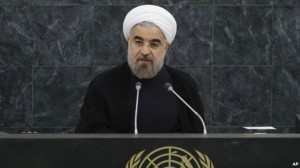 At a meeting with influential editors and columnists today, Iranian President Rouhani urged the US not to see his refusal as a bad sign for negotiations.
At a meeting with influential editors and columnists today, Iranian President Rouhani urged the US not to see his refusal as a bad sign for negotiations.
Iran’s President Hassan Rouhani expanded his American charm offensive this morning, saying he was ready to alter decades of US-Iran hostility and that there was “nothing we seek to hide” about Iran’s controversial nuclear program.
“In the past 35 years between the US and Iran, both sides have made mistakes,” the centrist cleric told a group of editors and columnists from leading American news organizations over breakfast in New York, a day after addressing the UN General Assembly.
“Regardless of correct or incorrect measures, what we have before us is a conclusion that is not desirable,” said Mr. Rouhani.
He said the fact that he did not end up shaking the hand of President Barack Obama should not be construed as a lack of interest in rapprochement. The symbolic act would have signaled a joint willingness to move toward détente for the first time since Iran’s 1979 Islamic revolution.
There are “no problems in terms of shaking Mr. Obama’s hand and negotiating with him,” Rouhani said. “It was two days ago that the US proposed a meeting and we were not opposed. This is a very sensitive subject. We have not talked at that level for 35 years. We must take these steps carefully.”
Senior administration officials said the possible handshake on the sidelines of the UN assembly – which was built up by both sides yesterday as a distinct possibility – proved “too complicated” for Iran at this time, “given their own dynamic back home.”
“We are ready to negotiate, but we didn’t have enough time to make that happen,” said Rouhani. “The handshake is a symbolic issue.”
A top priority in New York for both Iran and the US has been to reinvigorate negotiations between Iran and six world powers over capping Iran's nuclear program so that it can never build a nuclear weapon – an aim Iran publicly rejects. Six rounds of talks since early 2012 have so far yielded only stalemate.
US Secretary of State John Kerry has been tasked by Obama to “closely” follow up, starting with a meeting in New York tomorrow between the six world powers and Iran's US-educated foreign minister, Mohammad Javad Zarif.
“There’s nothing we seek to hide,” said Rouhani, adding “all” of Iran’s declared nuclear sites are under UN inspection and that Iran only wants its “legal rights” to enrich uranium, as specified by the international Nuclear Non-Proliferation Treaty, to which Iran is a signatory.
“Forty countries are doing enrichment. We want nothing less, nothing more,” said Rouhani.
Iran has long tried to normalize its nuclear program, remove UN resolutions requiring it to prove that its program is peaceful, and lift crippling US sanctions. Rouhani said restricting the levels of enrichment – especially Iran’s work to 20 percent purity, which is a few technical steps from bomb-grade – was negotiable.
“Whether it’s 20 percent enrichment or 5 percent enrichment, all of those can be placed on the table and examined,” said Rouhani. “The endgame is the removal of everyone’s concerns, and the restoration of Iran’s rights” to enrich uranium.
The Iranian president, who scored an upset victory against a host of conservative rivals in mid-June elections under the slogan of “hope and prudence,” also clarified his views on the Holocaust – a historical event questioned by his predecessor, Mahmoud Ahmadinejad.
“The Nazis committed a crime in World War II. As to the scale of the massacres, and the numbers that my predecessor mentioned, let’s leave that to the historians,” said Rouhani. The Nazis carried a “massacre that cannot be denied – especially against the Jewish people,” he said, calling it a “horrendous crime.”
By The Christian Science Monitor
The Iran Project is not responsible for the content of quoted articles.

 QR code
QR code